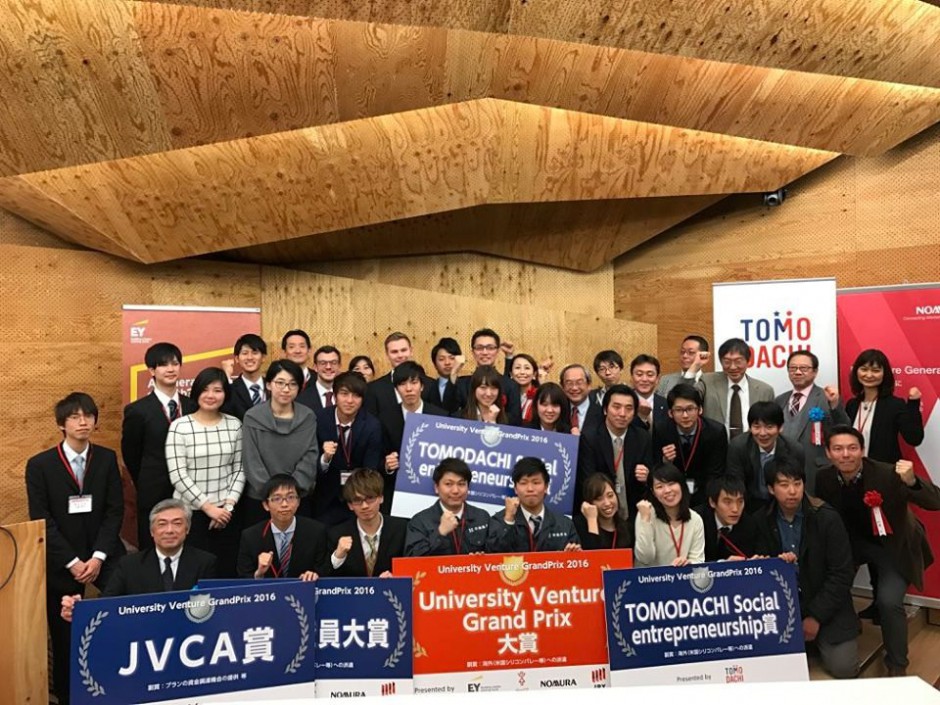Two Teams Receive the TOMODACHI Social Entrepreneurship Award at the University Venture Grand Prix Competition 2016 (UVGP2016)
On January 22, 2017, the University Venture Grand Prix Competition 2016 (UVGP 2016), hosted by the Ministry of Economy, Trade and Industry (METI), was held in the Daiwa Ubiquitous Computing Research Building at the University of Tokyo’s Hongo Campus. Ten teams who successfully won the preliminary contests had an opportunity to pitch their business plans to a panel of judges composed of entrepreneurs, professors, and leaders from various fields.
Koyonosha Inc. won three awards: the University Venture Grand Prix Award; the Educational Judge Grand Prix Award, which is selected by professors of Entrepreneurship Education; and the Japan Venture Capital Award (JVCA), which is selected by investors.
This year, the TOMODACHI Social Entrepreneurship Award, which recognizes business plans that focus on social good, was awarded to Ciamo and to Common ice plant. Mr. Hajime Sugiura, Manager of the Corporate Planning Division, ETIC, and Mr. Ryan Way, Economic Officer, Trade and Economic Policy Unit, U.S. Embassy, presented the award on behalf of the judges and provided commentary.
The winning teams will travel to Silicon Valley in March 2017, where they will pitch their business plans to various venture capital firms, start-ups, NPOs, and accelerators.
Meet the Winning Teams
Team: Koyonosha Inc. (Keio University, Tokyo)
“Koyonosha” challenges the belief that “Farming is not profitable” by attempting to increase agricultural productivity, despite a decline in people engaging in agriculture. Their business plan includes inventing a cultivation device producing Microbubbles to alleviate the spread of diseases and increase the yield of harvested crops. The equipment is leased to farmers at a very reasonable price. Koyonosha received the awards based on the following considerations: The device has already been developed and is available; and Koyonosha is highly motivated and passionate towards revolutionizing the agricultural sector by increasing the population of those working in agriculture and reducing the number of abandoned agricultural fields.
Team: Ciamo (Sojo University, Kumamoto Prefecture)
With the slogan, “Kuma shochu lees and photosynthetic bacteria will save the world,” Ciamo pitched their business plan to produce and sell microorganisms and photosynthetic bacteria at low cost by recycling the leftover lees from shochu production. Ciamo hopes to encourage shrimp farms and mariculture and agriculture farms to use these microorganisms. By doing so, the farms could contribute to developing a recycling-oriented society, in which fewer chemicals are used and more byproducts are reused. Ciamo received the TOMODACHI Social Entrepreneurship Award for their prosocial, ecofriendly business plan that is revitalizing regional communities.
Team: Common ice plant (Ritsumeikan University, Kyoto Prefecture)
Common ice plant was inspired by the fact that in Tunisia, drought- and salt-tolerant succulent plants, commonly called ice plants, are being disposed of like weeds. Common ice plant’s business plan is to produce and pulverize ice plants in Tunisia and export it as a nutritious salt substitute to countries with large, health-conscious populations like Japan, while also contributing to low-wage local farms in Tunisia. Common ice plant received the TOMODACHI Social Entrepreneurship Award for their business plan that encourages fair trade and Creating Shared Value (CSV).
Special Recognition
Team: ShareTre (Tsukuba University, Ibaraki Prefecture)
“ShareTre” was established to help amateur sports coaches facing such challenges as, “I have trouble developing training menus,” or “I don’t know effective training methods.” “ShareTre,” which stands for “sharing training,” is a web-based platform where amateur coaches can share their training menus and ideas with each other. The service first started with sharing training videos, and in the future, “Sharetre” envisions launching an application program that helps manage training schedules, track players’ time and attendance records, and match games with other teams.



